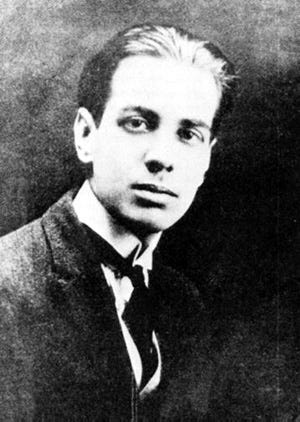The Forms of Longing in Borges and Proust
In memoriam William Ferguson, Fergu.
"The ball I threw while playing in the park / Has not yet reached the ground."
Dylan Thomas
The distinction between trifle and matter of importance is a teleological one and in so far as it deals with time spent, it interrogates it with a rather mundane question, a trifle, if you will: for what? For what or in what was time spent? The answers that the trifle offers is "nothing important"... a wasted time, a loss of time. In contrast, the answer that important matters offer is "in necessary thing... for great things, for their sake" and declares a fruitful time, a day seized. I will return to Horatius later.
Matters of importance are the substance of stories and they make up the history of a resolution or, if one prefers, the history of an end. These premises, necessities disguised sometimes as contingencies, move reasons in the direction of a conclusion where ultimately they will find justification another true relevance will be revealed. It is particularly true of the children of Poe, who following the demiurgic pupil of the good Dupin are committed to offer soteriologies for everything and anything even if that demands the deduction of a marauding Orangutang in Paris. No work since the Rue Morgue has been so perfectly capable of showing the intellectual ineptitude of the genre and of its offsprings.
The failure of the matter-of-importance in literature is not reserved to the unfortunate emergence in Anglo-American narrative projects (particularly those beyond literature) of the simiae ex machina. Perhaps much more insidious is the unabashed proliferation of the crucial. Indeed, the soteriological compulsion has meant that the relevance of minutiae is revealed by its mere presence on the page. The proverbial Chekhov gun--beloved by American instructors in writing programs--hangs from the wall for many days and pages in different lights, under different glances to justify those pages, those lights, those glances and those shades in a final death. The hanging, inert, gun is in that narrative compulsion a promise and belongs to an economy of reasons in which the shot, the blood, the body justify its presence and make the mere mention of the object an event that the narration registers.
Nobody, in my view, has been more successful than Borges in unveiling these architectures of practical reasons that constitute the skeletal anatomy of the tale. Borges made of literary vivisection a thing of beauty. For instance, in Tema del Traidor y del Héroe, an imperfectible expression of this project, Borges presents that story as the summary of a plot. As the construction of the plot solidifies, the narrative mostly stripped of literary adornments progressively takes the force of the summation of an historical unfolding. In the end, the short piece boasts a type of mathematical elegance, which seems refractory to the conventions of literary etiquete. The traitor is the hero and the hero is the traitor.
It is, however, another and much shorter piece of prose of the same author that can be more economically used to illustrate the point. The title of the two paragraphs is The Plot, which in Spanish as in English can mean both the argument and the conspiracy. Here is my translation:





